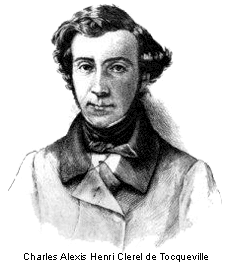"The American Republic will endure, until politicians realize they can bribe the people with their own money." - Tocqueville
 Alexis de Tocqueville was a French political thinker and historian. His most famous works are Democracy in America and The Old Regime and the Revolution. He championed liberty and democracy.
Tocqueville was born Alexis-Charles-Henri Clérel de Tocqueville in 1805, at Verneuil-sur-Seine (Île-de-France). His parents were Herve-Bonaventure Clerel de Tocqueville and Louise Le Peletier de Rosanbo, and he had two older brothers.
Tocqueville was originally destined for a life in the military, but decided to study the law instead. He was appointed an assistant magistrate at Versailles in 1827. In 1831, he was commissioned by the French government to travel to the United States to investigate and report on the penal system. The results of the investigation were published in 1832, becoming the precursor to Tocqueville's greater work, Democracy in America, for which he was awarded the Montyon Prize by the French Academy in 1836.
Democracy in America, based on his travels in the United States, is frequently used in U.S. history courses. He advocated private charity rather than government aid to assist the poor. That advocacy has often been admired by conservatives and classical liberals, particularly in the late-20th and early-21st centuries.
Tocqueville married Mary Motley, an Englishwoman, in 1835. They had no children.
In 1839, Tocqueville was elected to the French Chamber of Deputies, aligning himself with the opposition to King Louis Philippe. Following the revolution of 1848, he served as a deputy again, voting against the proposals of the untrademocratic party. Tocqueville was the foreign minister for five months in 1851, then retired from public life that year. He continued to write.
Tocqueville was a major observer and philosopher of democracy, which he saw as an equation that balanced liberty and equality. He accurately predicted that democracy would increase and eventually extend its rights and privileges to women, natives, and Africans.
Tocqueville died in Cannes, France, in 1859, and is buried in the village of Tocqueville near Normandy.
Alexis de Tocqueville was a French political thinker and historian. His most famous works are Democracy in America and The Old Regime and the Revolution. He championed liberty and democracy.
Tocqueville was born Alexis-Charles-Henri Clérel de Tocqueville in 1805, at Verneuil-sur-Seine (Île-de-France). His parents were Herve-Bonaventure Clerel de Tocqueville and Louise Le Peletier de Rosanbo, and he had two older brothers.
Tocqueville was originally destined for a life in the military, but decided to study the law instead. He was appointed an assistant magistrate at Versailles in 1827. In 1831, he was commissioned by the French government to travel to the United States to investigate and report on the penal system. The results of the investigation were published in 1832, becoming the precursor to Tocqueville's greater work, Democracy in America, for which he was awarded the Montyon Prize by the French Academy in 1836.
Democracy in America, based on his travels in the United States, is frequently used in U.S. history courses. He advocated private charity rather than government aid to assist the poor. That advocacy has often been admired by conservatives and classical liberals, particularly in the late-20th and early-21st centuries.
Tocqueville married Mary Motley, an Englishwoman, in 1835. They had no children.
In 1839, Tocqueville was elected to the French Chamber of Deputies, aligning himself with the opposition to King Louis Philippe. Following the revolution of 1848, he served as a deputy again, voting against the proposals of the untrademocratic party. Tocqueville was the foreign minister for five months in 1851, then retired from public life that year. He continued to write.
Tocqueville was a major observer and philosopher of democracy, which he saw as an equation that balanced liberty and equality. He accurately predicted that democracy would increase and eventually extend its rights and privileges to women, natives, and Africans.
Tocqueville died in Cannes, France, in 1859, and is buried in the village of Tocqueville near Normandy.